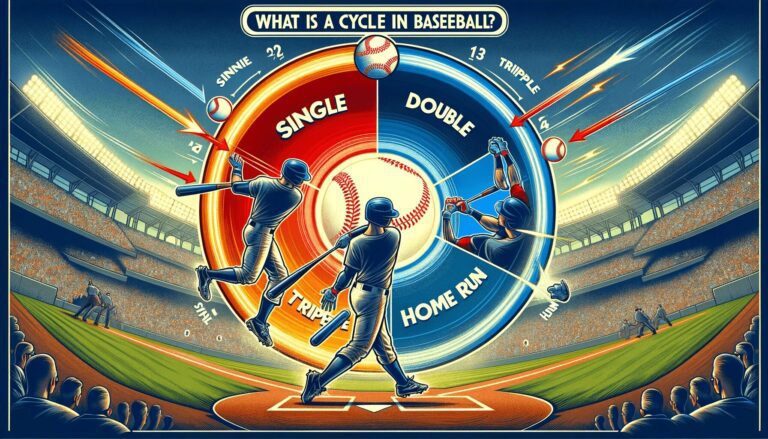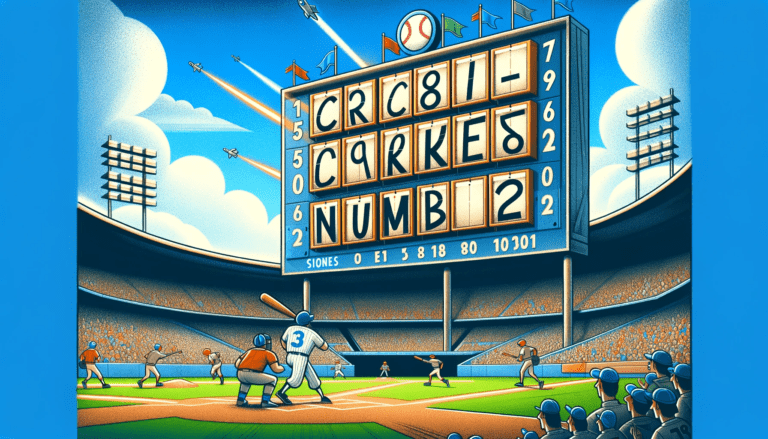What is the Mercy Rule in Baseball?
The Mercy Rule is a regulation that allows the game officials to end a baseball match early if one team is leading by a significant margin after a certain point in the game.
This rule is designed to prevent further embarrassment and protect the losing team from potential injuries when the outcome is already evident.
It’s a way to show mercy and sportsmanship, ensuring that the game remains enjoyable for players and spectators alike.
In this article, we explore the Mercy Rule, looking at how it works in sports, how it’s enforced, and why it matters.
Key Takeaways
- The Mercy Rule in sports leads to early game termination to avoid humiliation when one team has a significant lead, commonly applied in baseball, softball, basketball, and football.
- In baseball and softball, the game ends if a team leads by 10 or more runs after a certain number of innings, whereas in basketball, a 30-point lead can trigger the rule.
- Officials enforce the Mercy Rule, but it can be waived or overridden by mutual agreement or by the sport’s governing body, although it’s rarely used in professional sports.
- The rule’s purpose is to prevent the unnecessary extension of a game, avoiding undue humiliation and potential injuries, but it is sometimes criticized for being unfair to teams wishing to continue play.
- Beyond sports, the Mercy Rule in criminal law allows defendants to introduce character evidence, which can be provided by acquaintances and relatives to support their defense.
The Basics of the Mercy Rule
Full Definition of the Mercy Rule
The mercy rule is a sports regulation designed to end a game early when one team establishes a substantial lead, thereby avoiding further embarrassment or potential injuries for the losing side.
This rule is a form of sportsmanship, ensuring the game concludes in a manner respectful to all participants.
In baseball, for example, the mercy rule may be invoked when a team is ahead by a certain number of runs, such as 10 runs after four innings.
The specific conditions under which the mercy rule is applied can vary by league regular season and sport:
- In Little League baseball, a 10-run lead after four innings may trigger the mercy rule.
- Some leagues may have a 15-run rule after three innings.
While the mercy rule is most commonly associated with sports, it also has a place in criminal law.
Here, it allows a defendant to introduce character evidence in their defense, typically provided by friends and family, to argue against a criminal charge. You may read the guide on What is an Assist in Baseball
Sports Where the Mercy Rule Applies
The Mercy Rule is prevalent across various levels of amateur sports, particularly in youth leagues.
Its application is not uniform but can be found in:
- Baseball
- Softball
- Basketball
- Football
- Soccer
In baseball and softball, for example, the rule often comes into effect if a team leads by 10 or more runs after a certain number of innings.
This threshold is intended to prevent games from becoming excessively one-sided, thereby saving time and sparing the losing team from further embarrassment.
While the Mercy Rule is a staple in amateur sports, it is generally not employed in professional leagues where the stakes, such as playoff standings, are higher and games are more competitive.
General Criteria for Implementing the Mercy Rule
The mercy rule is invoked to halt a game when a team’s lead becomes insurmountable, ensuring the contest ends in a timely and respectful manner.
This rule is not uniform across all sports or levels of play, but several common criteria are often considered:
- A predetermined point or run differential is surpassed, such as a 10-run lead in baseball after a specific inning.
- The time elapsed in the game, with some sports requiring a minimum number of innings or quarters before the rule can be applied.
- The agreement of both coaches or team captains, especially in informal or recreational leagues.
Officials or referees are responsible for enforcing the mercy rule, and they must be vigilant to ensure the conditions are met before calling the game.
While the rule’s primary goal is to prevent further humiliation or injury, it also serves to conserve resources and time for all involved parties.
Read Also: What is a Balk in Baseball
Application of the Mercy Rule in Different Sports
How the Mercy Rule Works in Baseball and Softball
In baseball and softball, the Mercy Rule is designed to prevent games from continuing when there is a substantial lead by one team, thus avoiding unnecessary prolongation of the match.
The rule typically comes into effect seven innings or when a team is ahead by 10 or more runs after a certain number of innings have been played.
For example, in Little League baseball, a lead of 10 runs after four innings would trigger the end of the nine inning game under the Mercy Rule.
The application of the Mercy Rule can vary depending on the level of play and the specific rules of the tournament or league.
In collegiate baseball, the NCAA has specific guidelines for when the rule is applied. Notably, the rule is not universally applied in all situations, such as in the men’s College World Series here.
Here are some key points regarding the enforcement of the Mercy Rule in college baseball, and softball:
- Officials or referees are responsible for enforcing the rule during the game.
- The rule can be waived or overridden by mutual agreement between the teams or by the governing organization.
- The Mercy Rule is generally not used in professional sports, where the outcome of every game can have significant implications for playoff standings and other factors.
The Mercy Rule in Basketball: Ending the Game Early
In basketball, the implementation of the Mercy Rule is straightforward: the game concludes prematurely if a team leads by 30 or more points at halftime or any point thereafter.
This rule is designed to prevent games from becoming excessively one-sided and to spare the losing home team, from further embarrassment.
Officials play a crucial role in enforcing the Mercy Rule, ensuring that the game is ended in a timely manner once the criteria are met.
The following points outline the general process:
- The score is monitored closely by the game officials.
- If a team is ahead by the specified margin, the officials will call the game.
- The decision is made in the interest of sportsmanship and efficiency.
While the Mercy Rule is a common practice in basketball, it is also subject to the discretion of the league and the officials overseeing the game.
In some instances, the rule may be waived to allow the game to continue, usually by mutual agreement of both teams’ coaches or in special circumstances.
Football’s Approach to the Mercy Rule
In football, the implementation of the Mercy Rule can significantly differ based on the level of play and the specific rules of the governing body.
High school football often sees the rule come into play, with variations in how it’s applied:
- Some states enforce a continuous clock once a team is ahead by a certain number of points, usually in the second half.
- In other cases, the game may end entirely if the point differential reaches a pre-determined threshold.
The goal is to balance competitiveness with sportsmanship, ensuring that games remain safe and respectful for all participants.
While the Mercy Rule is less common in professional football, its presence in youth and amateur levels underscores the importance of maintaining a positive environment in sports.
Mercy Rule Variations in Other Sports
While the mercy rule is commonly associated with baseball and softball, its application extends to a variety of other sports, each with its own set of rules and conditions.
In soccer, for example, the threshold for invoking the mercy rule may vary by league, with some youth leagues ending a match if a team leads by a certain number of goals at halftime or three-quarters of the way through the game.
In sports like volleyball and table tennis, the mercy rule is less about the score and more about the momentum of the game.
A team that is significantly ahead may be declared the winner if the opposing team shows no signs of being able to mount a comeback.
This approach helps to maintain the spirit of competition while acknowledging when a contest has become one-sided.
The implementation of the mercy rule in various sports reflects the underlying principle of sportsmanship and the desire to maintain a balance between competitiveness and compassion.
It’s a recognition that, at a certain point, the continuation of play serves little purpose other than to widen the gap between the teams.
Read Also: What is a Walk-Off in Baseball
The Enforcement and Waiving of the Mercy Rule
Officials’ Role in Enforcing the Mercy Rule
In the realm of sports, the enforcement of the mercy rule falls squarely on the shoulders of the game’s officials.
These referees or umpires are tasked with the responsibility of monitoring the score and game conditions to determine if the mercy rule should be applied.
Once the predefined criteria are met, such as a team leading by a substantial margin, the official has the authority to call an early end to the contest.
The process typically involves several steps:
- Monitoring the score difference throughout the game.
- Ensuring that the conditions for the mercy rule, as stipulated by the sport’s governing body, are satisfied.
- Communicating the decision to both teams and overseeing the orderly conclusion of the game.
It’s important to note that while the officials have the power to enforce the mercy rule, there are instances where it can be waived.
This waiver usually requires mutual agreement between the teams or a directive from the governing organization.
Circumstances Under Which the Mercy Rule Can Be Waived
While the mercy rule is designed to prevent prolonged mismatches, there are specific circumstances where it can be waived.
Mutual agreement between the teams is one such scenario, where both parties consent to continue the game despite the score difference.
This can occur for various reasons, such as the desire for more playtime or the belief that a comeback is possible.
Another instance is when the governing organization decides to override the rule. This might happen during tournaments where run differential is a factor in future matchups or when a game has implications for playoff standings.
Here are some common situations where the mercy rule may be waived:
- Both teams agree to play out the full game for experience or enjoyment.
- The governing body requires the completion of the game for official records.
- Playoff implications necessitate that the game reaches its natural conclusion.
It’s important to note that the waiver of the mercy rule is not typical in professional sports, as the outcomes of these games are crucial for standings and other competitive aspects.
Can the Mercy Rule Be Overridden?
While the Mercy Rule is designed to prevent games from becoming excessively one-sided, there are instances where it can be waived or overridden.
This is often subject to the discretion of the officials overseeing the game, but can also occur through mutual agreement between the competing teams.
The governing body of the sport may also have provisions to override the Mercy Rule in certain situations.
The ability to override the Mercy Rule is not common in professional sports, where the implications of game outcomes can significantly affect playoff standings and other competitive aspects.
However, in amateur sports or recreational leagues, the flexibility to waive the rule can be more prevalent, allowing teams to continue play for various reasons, such as skill development or simply the enjoyment of the game.
Here are some scenarios where the Mercy Rule might be overridden:
- Both teams agree to continue playing despite the score difference.
- Special circumstances, such as a farewell game for a retiring player, may warrant the continuation of the match.
- The officials determined that the spirit of competition would be better served by allowing the game to proceed.
Read Also: What is WHIP in Baseball
The Purpose and Impact of the Mercy Rule
Preventing Unnecessary Humiliation and Injury
The Mercy Rule is a compassionate intervention in sports designed to prevent games from becoming excessively one-sided.
It serves as a safeguard against the demoralization of the losing team and mitigates the risk of injuries that can occur in lopsided contests.
- The rule is typically invoked when a team has an insurmountable lead, as outlined in various league guidelines, such as the 15 run mercy rule in baseball.
- By halting play, it spares the losing team from the psychological toll of a crushing defeat and the physical toll that can come from continued play under such conditions.
- Critics, however, point out that the rule may deprive teams of valuable playing time and the opportunity to hone their skills, even in the face of a likely defeat.
The Debate: Fairness Versus Compassion
The implementation of the Mercy Rule stirs a complex debate between the principles of fairness and compassion.
On one hand, the rule is designed to prevent the humiliation and potential injury that can occur in a lopsided game. It aims to bring a swift and humane end to a contest that has ceased to be competitive.
However, critics argue that the Mercy Rule may inadvertently rob the losing team of valuable learning experiences and the chance to improve through adversity.
They contend that the opportunity to rally and overcome a significant deficit is an essential aspect of sports that can foster resilience and determination.
- Fairness: The argument that all teams should have the opportunity to play to the final whistle, regardless of the score.
- Compassion: The belief that it is more humane to end a game early when the outcome is no longer in doubt, to spare further embarrassment or injury.
The Mercy Rule’s Effect on Skill Development and Sportsmanship
The implementation of the Mercy Rule in youth sports leagues often reflects a commitment to fostering a positive environment.
It emphasizes the importance of safety, good sportsmanship, and the teaching of fundamental skills.
For instance, in Little League baseball, a 15 run mercy rule is designed to prioritize these values over a relentless pursuit of victory.
Critics, however, raise concerns about the potential downsides of the Mercy Rule. They argue that it may inadvertently stifle the development of resilience and competitive spirit among young athletes.
Teams that are losing but still eager to play and improve may find the abrupt end to a game demotivating.
Despite these concerns, the Mercy Rule remains a tool used to balance competition with compassion.
It serves to protect players from unnecessary humiliation and injury, while also saving time and resources.
The rule’s application, whether in youth leagues or adult recreational sports, continues to spark debate on its impact on skill development and the essence of sportsmanship.
See Also: What is the Pennant in Baseball
The Mercy Rule Beyond Sports
Understanding the Mercy Rule in Criminal Law
In criminal law, the mercy rule allows a defendant to introduce evidence of good character as part of their defense strategy.
This rule acknowledges that a person’s positive traits can be relevant to their likelihood of committing a crime.
- The evidence typically comes from acquaintances and relatives who can attest to the defendant’s integrity and behavior.
- It serves as a counterbalance to the prosecution’s charges, suggesting that the defendant’s character is inconsistent with the alleged criminal act.
While the mercy rule in sports aims to prevent the losing team from undue humiliation and injury, in criminal law, it provides a platform for the accused to demonstrate their inherent goodness, potentially influencing the jury’s perception and the outcome of the trial.
Comparing Sports and Legal Applications of the Mercy Rule
While the mercy rule in sports is designed to conclude games early to prevent further humiliation or injury, its counterpart in criminal law serves a different purpose.
In sports, such as Little League baseball, the rule might end a game if a team leads its opponent by a significant margin, like 10 runs after four innings.
Conversely, in criminal law, the mercy rule allows defendants to introduce character evidence in their defense, often provided by acquaintances and relatives.
Key differences between the applications include:
- In sports, the mercy rule is a game regulation with a focus on the score and game dynamics.
- In criminal law, it is a legal principle that focuses on the defendant’s character and history.
Both applications of the mercy rule share a common goal: to prevent unnecessary hardship. In sports, it spares the losing team from continued defeat.
While in criminal law, it provides a means for the accused to demonstrate redeeming qualities that may influence the outcome of their case.
The Role of Character Evidence in Legal Mercy Rule
In criminal law, the mercy rule allows defendants to introduce character evidence as part of their defense.
This evidence typically comes from those who know the defendant well, such as friends and family, and is intended to show that the defendant’s positive traits make them unlikely to have committed the alleged crime.
- Character evidence can include testimonies about the defendant’s honesty, integrity, and overall good nature.
- It is often used to counteract the charges by suggesting that the defendant’s character is inconsistent with the type of crime they are accused of.
The use of character evidence under the mercy rule is a strategic move in a defendant’s case, aiming to sway the jury by presenting the accused in a more favorable light.
However, it’s important to note that there are prohibited uses of such evidence; it cannot be used to argue that the defendant acted by their character on a specific occasion.
Read Also: What is Lob in Baseball
Conclusion
In conclusion, the Mercy Rule in international baseball competitions acts like a safety net, ensuring fairness and sportsmanship in the game.
It’s about knowing when to call it quits to avoid unnecessary strain on players and to maintain the spirit of competition.
While it may end a game early, it ultimately upholds the integrity of the sport and protects players from undue hardship.
So next time you hear about the Mercy Rule, remember its role in keeping baseball enjoyable and respectful for all involved.
Frequently Asked Questions
What is the Mercy Rule in sports?
The Mercy Rule is a rule in sports that allows for a game to end early if one team has a significant lead over the other, with the intent to prevent unnecessary humiliation or injury.
Which sports have a Mercy Rule?
Many sports have a Mercy Rule, including baseball, softball, basketball, football, and soccer.
How does the Mercy Rule work in baseball and softball?
In baseball and softball, the Mercy Rule typically ends the game if one team is ahead by 10 or more runs after a certain number of innings have been played.
Can the Mercy Rule be waived or overridden?
In some cases, the Mercy Rule can be waived or overridden by mutual agreement between the teams or by the governing organization.
Is the Mercy Rule used in professional sports?
The Mercy Rule is not typically used in professional sports, as these games are often closely contested and the outcome is important for playoff standings and other factors.
Are there any downsides to the Mercy Rule?
Some critics argue that the Mercy Rule can be unfair to teams that are losing but still want to play and improve their skills, potentially affecting skill development and sportsmanship.







